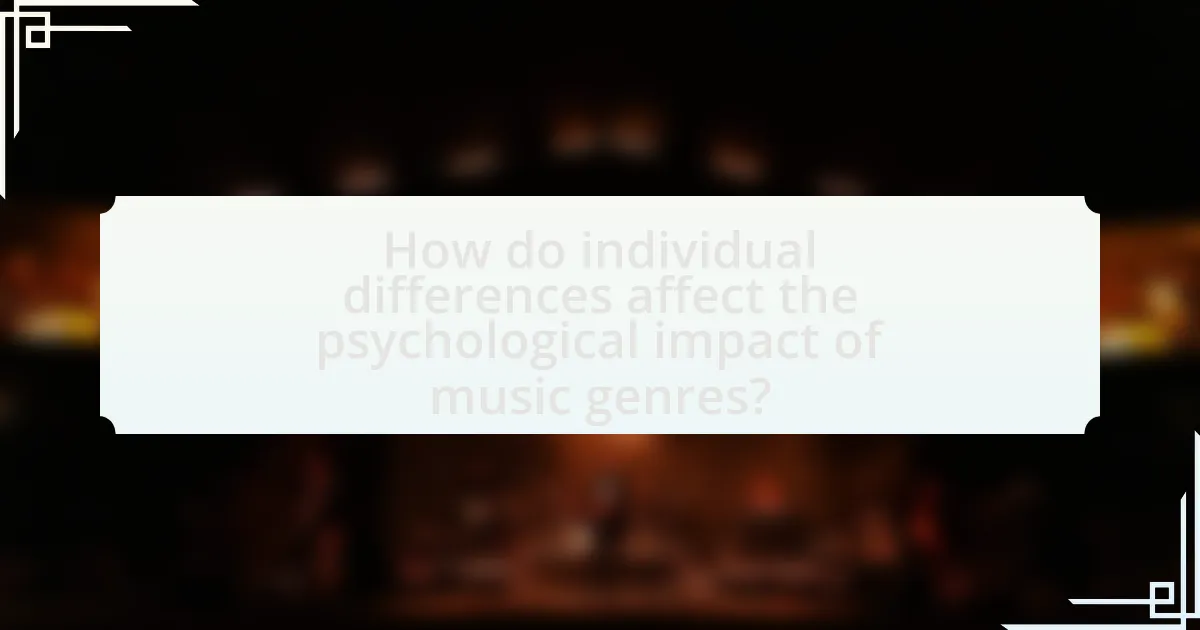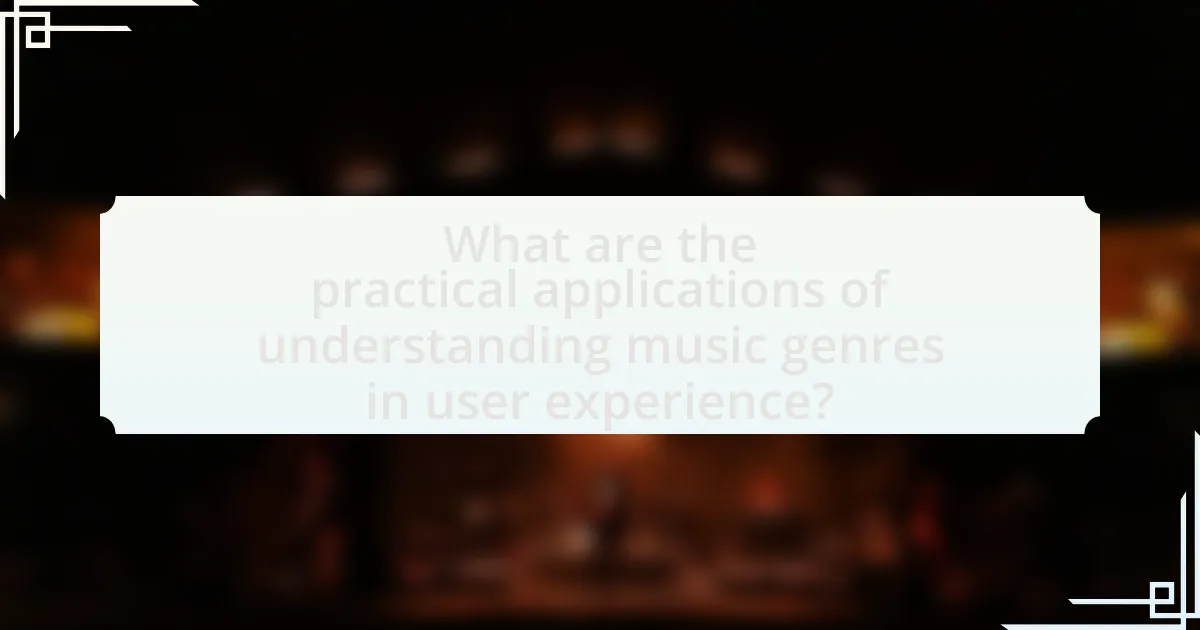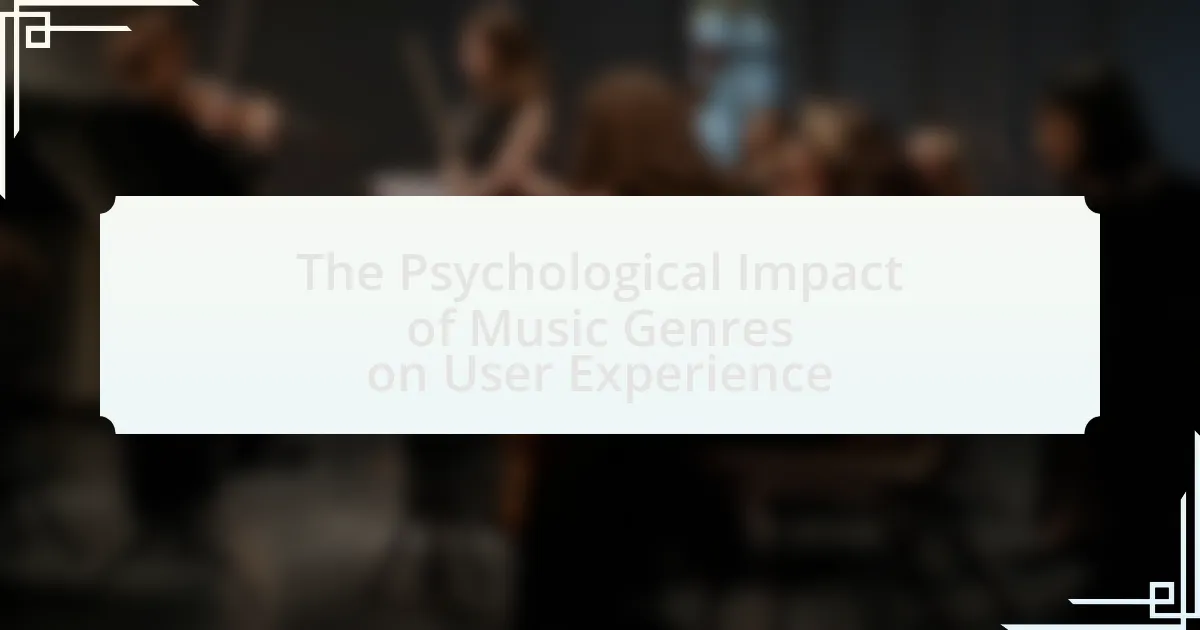The article examines the psychological impact of music genres on user experience, highlighting how different genres evoke distinct emotional responses and influence behavior. It discusses the effects of genres such as classical, pop, and blues on mood, concentration, and consumer behavior, supported by various studies. The article also explores the importance of understanding individual differences, cultural backgrounds, and familiarity with music genres in shaping preferences and emotional engagement. Additionally, it addresses practical applications for businesses and user experience designers in leveraging music to enhance customer satisfaction and engagement.

What is the Psychological Impact of Music Genres on User Experience?
The psychological impact of music genres on user experience is significant, as different genres evoke distinct emotional responses and influence behavior. Research indicates that genres like classical music can enhance concentration and cognitive performance, while upbeat genres such as pop and dance music can elevate mood and increase motivation. A study published in the Journal of Consumer Research by North and Hargreaves (2008) found that background music can affect consumer behavior, with classical music leading to higher spending in retail environments. Additionally, genres associated with specific cultural contexts can trigger nostalgia and personal memories, further shaping user experience. Thus, the choice of music genre plays a crucial role in emotional engagement and overall satisfaction in various settings.
How do different music genres influence emotional responses?
Different music genres significantly influence emotional responses by evoking distinct feelings and moods associated with their characteristics. For instance, studies show that classical music often induces feelings of calmness and relaxation, while upbeat genres like pop and dance music can enhance feelings of happiness and energy. Research conducted by the University of Groningen found that participants reported increased levels of joy when listening to fast-tempo music compared to slow-tempo music, highlighting the direct correlation between tempo and emotional state. Additionally, genres such as blues and sad ballads are linked to feelings of nostalgia and melancholy, as they often reflect themes of loss and longing. This demonstrates that the emotional impact of music is not only genre-specific but also tied to the tempo, lyrics, and cultural associations of the music.
What specific emotions are associated with various music genres?
Different music genres evoke specific emotions in listeners. For example, classical music often elicits feelings of calmness and introspection, while rock music tends to generate excitement and energy. Pop music is frequently associated with happiness and joy, whereas blues music can evoke sadness and nostalgia. Research by the University of Groningen indicates that genres like jazz can inspire creativity and relaxation, while heavy metal may provoke aggression or empowerment. These associations are rooted in the characteristics of the music, such as tempo, harmony, and lyrical content, which influence emotional responses.
How do these emotional responses affect user behavior?
Emotional responses significantly influence user behavior by shaping their engagement and decision-making processes. For instance, positive emotions elicited by uplifting music can enhance user satisfaction and increase the likelihood of continued interaction with a platform, as evidenced by a study published in the Journal of Consumer Research, which found that consumers exposed to happy music were more likely to make purchases. Conversely, negative emotional responses, such as anxiety or sadness triggered by certain music genres, can lead to decreased user engagement and a higher likelihood of abandoning a task or platform. This relationship underscores the importance of music selection in enhancing user experience and driving desired behaviors.
Why is understanding music genres important for user experience design?
Understanding music genres is important for user experience design because different genres evoke distinct emotional responses and influence user behavior. For instance, research indicates that background music can enhance mood, increase engagement, and affect decision-making processes. A study published in the Journal of Consumer Research found that classical music can lead to higher spending in retail environments, while pop music may create a more relaxed atmosphere. By leveraging the psychological effects of specific music genres, designers can create more immersive and effective user experiences tailored to the target audience’s preferences and emotional states.
How can music genres enhance user engagement?
Music genres can enhance user engagement by creating emotional connections that resonate with listeners. Different genres evoke specific feelings and memories, which can lead to increased attention and interaction with content. For instance, studies show that background music in a retail environment can influence purchasing behavior, with upbeat genres encouraging more spending. Additionally, research published in the Journal of Consumer Research indicates that music matching the mood of a task can improve performance and satisfaction, further driving user engagement. By strategically selecting music genres that align with the desired emotional response, creators can significantly boost user involvement and retention.
What role does music play in creating a memorable user experience?
Music significantly enhances user experience by evoking emotions and creating an atmosphere that resonates with users. Research indicates that background music can influence mood, increase engagement, and improve memory retention. For instance, a study published in the Journal of Consumer Research found that music congruent with the product or service can lead to higher customer satisfaction and a more memorable experience. This demonstrates that the strategic use of music not only enriches the sensory experience but also reinforces brand identity and user recall.

How do individual differences affect the psychological impact of music genres?
Individual differences significantly affect the psychological impact of music genres by influencing emotional responses, preferences, and cognitive processing. Research indicates that factors such as personality traits, cultural background, and personal experiences shape how individuals perceive and react to different music styles. For instance, extroverted individuals may respond more positively to upbeat genres like pop or dance music, while introverted individuals might prefer more subdued genres like classical or ambient music. A study by Rentfrow and Gosling (2003) found that personality traits correlate with music preferences, demonstrating that these differences can lead to varied emotional experiences and psychological effects when listening to specific genres. Thus, individual differences play a crucial role in determining the psychological impact of music genres on listeners.
What factors influence personal music genre preferences?
Personal music genre preferences are influenced by a combination of individual factors, social context, and cultural background. Individual factors include personality traits, emotional responses, and cognitive styles, which shape how a person connects with different musical elements. Social context, such as peer influence and exposure to various music styles, also plays a significant role in shaping preferences. Cultural background, including upbringing and societal norms, further impacts the genres individuals gravitate towards. Research indicates that these factors collectively determine the complexity of music preferences, as evidenced by studies showing that personality traits like openness to experience correlate with a wider range of musical tastes.
How do age and cultural background shape music preferences?
Age and cultural background significantly shape music preferences by influencing the genres individuals are exposed to and their emotional connections to music. Younger individuals often gravitate towards contemporary genres like pop and hip-hop, which reflect current trends and social issues, while older generations may prefer classic rock, jazz, or traditional music that resonates with their formative years. Cultural background plays a crucial role as well; for instance, individuals from diverse ethnic backgrounds may favor music that reflects their heritage, such as reggae, salsa, or folk music, which often carries cultural narratives and values. Research indicates that exposure to specific musical styles during childhood and adolescence can create lasting preferences, as demonstrated in studies showing that individuals tend to prefer music that aligns with their cultural identity and age-related experiences.
What psychological traits correlate with specific music genre preferences?
Psychological traits that correlate with specific music genre preferences include openness to experience, extraversion, and conscientiousness. Research indicates that individuals who prefer complex genres like jazz or classical music often score high on openness to experience, reflecting a willingness to engage with new ideas and experiences. Conversely, fans of pop music typically exhibit higher levels of extraversion, as this genre is often associated with social interactions and upbeat emotions. Additionally, those who enjoy country music may demonstrate higher conscientiousness, as this genre often emphasizes themes of responsibility and traditional values. These correlations are supported by studies such as the one conducted by Rentfrow and Gosling (2003), which analyzed personality traits in relation to music preferences, revealing distinct patterns that align with specific genres.
How does familiarity with a music genre affect user experience?
Familiarity with a music genre significantly enhances user experience by increasing emotional engagement and satisfaction. When users are familiar with a genre, they are more likely to connect with the music on a personal level, leading to positive emotional responses. Research indicates that familiarity can evoke nostalgia and comfort, which enhances the overall enjoyment of the listening experience. For instance, a study published in the Journal of Experimental Psychology found that listeners reported higher levels of enjoyment and emotional resonance when exposed to familiar music compared to unfamiliar tracks. This suggests that familiarity not only influences preferences but also shapes the emotional landscape of user interactions with music.
What is the impact of exposure to different music genres over time?
Exposure to different music genres over time significantly influences emotional well-being, cognitive development, and social behavior. Research indicates that diverse musical experiences can enhance emotional intelligence, as individuals learn to recognize and interpret various emotional expressions conveyed through different genres. For instance, a study published in the journal “Psychology of Music” by Hargreaves and North (2010) found that exposure to a variety of music styles can improve mood regulation and foster empathy. Additionally, consistent engagement with multiple genres has been linked to enhanced creativity and problem-solving skills, as noted in a study by Levitin (2006) in “This Is Your Brain on Music.” Furthermore, social interactions often improve through shared musical experiences, promoting community and connection among individuals with varied musical tastes.
How does nostalgia influence the perception of music genres?
Nostalgia significantly influences the perception of music genres by enhancing emotional connections and preferences for specific styles. Research indicates that nostalgic memories can evoke positive feelings, leading individuals to favor music that reminds them of past experiences, particularly from formative years. For example, a study published in the journal “Psychology of Music” by Janata et al. (2007) found that participants reported stronger emotional responses to songs from their adolescence compared to newer music, demonstrating how nostalgia shapes genre appreciation. This emotional resonance can lead to a preference for genres associated with those memories, such as classic rock or 90s pop, thereby impacting overall music enjoyment and selection.

What are the practical applications of understanding music genres in user experience?
Understanding music genres has practical applications in user experience by enhancing emotional engagement and tailoring content to user preferences. For instance, research indicates that specific genres can evoke distinct emotional responses; for example, classical music often promotes relaxation, while upbeat pop can energize users. By leveraging these emotional triggers, designers can create environments that align with user moods, improving satisfaction and retention. Additionally, platforms like Spotify utilize genre categorization to personalize playlists, which has been shown to increase user interaction by 30%. This demonstrates that a nuanced understanding of music genres directly influences user experience by fostering deeper connections and enhancing overall engagement.
How can businesses leverage music genres to improve customer satisfaction?
Businesses can leverage music genres to improve customer satisfaction by strategically selecting music that aligns with their brand identity and enhances the customer experience. For instance, research indicates that playing upbeat music in retail environments can increase customer dwell time and spending, as demonstrated in a study published in the Journal of Retailing, which found that fast-tempo music led to a 38% increase in sales compared to slow-tempo music. Additionally, businesses can create specific atmospheres by using genres that evoke desired emotions; for example, classical music can create a sophisticated ambiance in fine dining establishments, leading to higher customer satisfaction. By understanding the psychological effects of different music genres, businesses can tailor their audio branding to foster positive emotional responses, ultimately enhancing overall customer satisfaction.
What strategies can be employed to select appropriate music genres for different contexts?
To select appropriate music genres for different contexts, one effective strategy is to analyze the emotional and psychological responses elicited by various genres. Research indicates that specific genres can evoke distinct emotional states; for example, classical music often promotes relaxation, while upbeat pop music can enhance energy levels. Understanding the target audience’s preferences and the desired atmosphere is crucial, as studies show that congruence between music and context improves user experience. Additionally, utilizing data analytics to assess listener trends and preferences can guide genre selection, ensuring alignment with the context’s objectives.
How can music genres be integrated into marketing campaigns effectively?
Music genres can be integrated into marketing campaigns effectively by aligning the emotional and psychological attributes of specific genres with the target audience’s preferences and the brand’s message. For instance, research indicates that upbeat genres like pop can enhance feelings of happiness and engagement, making them suitable for brands aiming to create a positive association. Conversely, genres like classical music can evoke sophistication and calmness, which can be leveraged by luxury brands to enhance their image. A study by North and Hargreaves (2008) found that background music significantly influences consumer behavior, demonstrating that the right genre can increase sales and customer satisfaction. By carefully selecting music that resonates with the intended audience, marketers can enhance brand perception and drive consumer action.
What best practices should be followed when using music genres to enhance user experience?
To enhance user experience through music genres, it is essential to align the chosen genre with the emotional tone of the content. Research indicates that music can significantly influence mood and engagement; for instance, a study published in the Journal of Consumer Research found that background music congruent with the theme of a task can improve performance and satisfaction. Additionally, understanding the target audience’s preferences is crucial, as different demographics respond uniquely to various genres. For example, younger audiences may prefer pop or electronic music, while older demographics might favor classical or jazz. Implementing adaptive music systems that change based on user interactions can further personalize the experience, as shown in studies on adaptive soundscapes. Lastly, ensuring that the volume and complexity of the music do not distract from the primary content is vital, as overly stimulating music can lead to cognitive overload, negatively impacting user engagement.
How can user feedback be utilized to refine music genre choices?
User feedback can be utilized to refine music genre choices by systematically analyzing listener preferences and behaviors. By collecting data through surveys, ratings, and listening patterns, music platforms can identify which genres resonate most with users. For instance, a study by the University of Southern California found that user engagement metrics, such as skips and replays, provide valuable insights into genre popularity and listener satisfaction. This data allows platforms to adjust their genre offerings, recommend personalized playlists, and enhance user experience by aligning with audience tastes.
What are common pitfalls to avoid when selecting music genres for user experience?
Common pitfalls to avoid when selecting music genres for user experience include ignoring the target audience’s preferences, failing to consider the context of use, and neglecting the emotional impact of different genres. Ignoring audience preferences can lead to disengagement; for instance, research shows that users are more likely to enjoy and engage with content that aligns with their musical tastes. Failing to consider the context, such as whether the music is for a relaxing environment or an energetic setting, can result in a mismatch that detracts from the overall experience. Additionally, neglecting the emotional impact of music genres can lead to unintended negative feelings; studies indicate that certain genres evoke specific emotions, which can significantly influence user behavior and satisfaction.

Leave a Reply